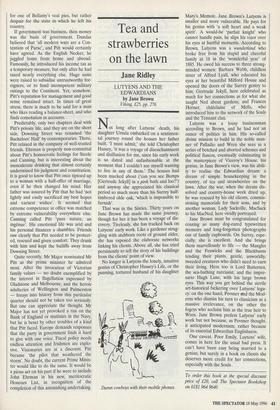Tea and strawberries on the lawn
Jane Ridley
LUTYENS AND THE EDWARDIANS by Jane Brown biking f25, pp. 276 Not long after Lutyens' death, his daughter Ursula embarked on a sentimen- tal journey round the houses her father built. 'I must admit,' she told Christopher Hussey, 'it was a voyage of disenchantment and disillusion for me, since his early work is so dated and unfashionable at the moment that I couldn't see myself wanting to live in any of them.' The houses had been mucked about (`can you see Bumps [Gertrude Jekyll] in a pink bath and loo?') and anyway she appreciated his classical period so much more than his Surrey half- timbered olde oak, 'which is impossible to furnish'.
That was in the Sixties. Thirty years on Jane Brown has made the same journey, though for her it has been a voyage of dis- covery. Tirelessly, she has tracked back on Lutyens' early work. Like a gardener strug- gling with stubborn roots of ground elder, she has exposed the elaborate networks linking his clients. Above all, she has tried persistently to tell the story of his buildings from the clients' point of view.
No longer is Lutyens the lonely, intuitive genius of Christopher Hussey's Life, or the punning, tortured husband of his daughter Damn cowboys with their mobile phones. Mary's Memoir. Jane Brown's Lutyens is smaller and more vulnerable. He pays for his genius with 'a soft heart and a weak spirit'. A would-be 'parfait knight' who cannot handle pain, he slips his vizor over his eyes at hurtful moments. According to Brown, Lutyens was a wunderkind who broke free from his stupid and cheerful family at 16 in the 'wonderful year' of 1885. He owed his success to three strong- minded women: Barbara Webb, childless sister of Alfred Lyall, who educated his eyes at her beautiful Milford House and opened the doors of the Surrey gentry to him; Gertrude Jekyll, here celebrated as much for her connections as for what she taught Ned about gardens; and Frances Horner, chatelaine of Mells, who introduced him to the network of the Souls and the Tennant clan.
Lutyens was a lousy businessman according to Brown, and he had not an ounce of politics in him. His so-called divine mission to build in the noble man- ner of Palladio and Wren she sees as a series of botched and aborted schemes and political fiascos, eventually culminating in the masterpiece of Viceroy's House. his genius, in Jane Brown's view, was his abili- ty to realise the Edwardian dream: a dream of simple housekeeping in the country, of tea and strawberries on the lawn. After the war, when the dream dis- solved and country-house work dried up, he was rescued by his old clients, commis- sioning memorials for their sons, and by another woman, Lady Sackville, MacSack to his MacNed, here vividly portrayed.
Jane Brown must be congratulated for coaxing so many dog-eared typewritten memoirs and long-forgotten photographs out of family cupboards. On Surrey, espe- cially, she is excellent. And she brings them marvellously to life — the Mangles and the Fenwicks and the Blackburns tending their plants, gentle, unworldly, tweeded creatures who didn't need to earn their living. Here too is Lord Battersea, the sea-bathing narcissist, and the impre- sario Hugh Lane, with his large brown eyes. This way you get behind the sterile art-historical bickering over Lutyens' lega- cy: on the one hand, Pevsner and the Mod- erns who dismiss his turn to classicism as a massive irrelevance, on the other the fogeys who acclaim him as the true heir to Wren. Jane Brown prefers Lutyens' early work but not because, as Pevsner thought, it anticipated modernism; rather because of its essential Edwardian Englishness.
One caveat. Poor Emily, Luytens' wife, comes in here for the usual bad press. It can't have been easy being married to a genius; but surely in a book on clients she deserves more credit for her connections, especially with the Souls.
To order this book at the special discount price of f20, call The Spectator Bookshop on 0181 964 9640


































































 Previous page
Previous page